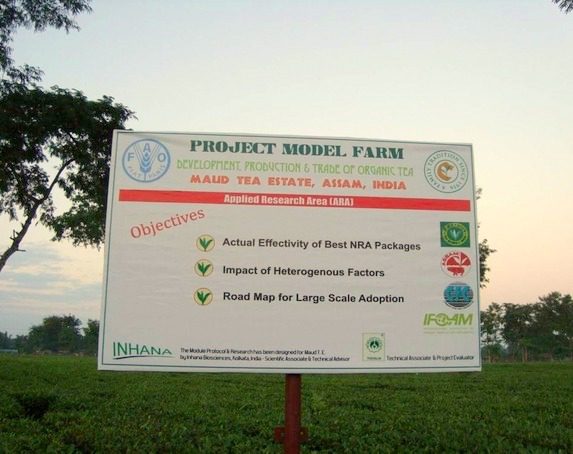
FAO Achievement
Goal for FAO-CFC-TBI organic tea development project as laid down by IFOAM
- Developing the technology, skills & systems of organic tea production.
- Developing appropriate technologies for establishing new organic tea plantations, and the methodologies for conversion of existing, conventional tea areas into organic tea farms.
With the desired Objectives
- Increase no. of farmers engaged in organic tea production.
- Increase in the production of organic tea.
The project was initiated in three ‘Tea Growing Zones’ of India i.e. Assam, Darjeeling & South India. Research was initiated at the existing tea research organization in these zones i.e. TRA, DTRDC & UPASI along with actual field validation in 100 hectare ‘Model Farm’ in each area. Maud Tea Estate (Dibrugarh) was selected for the Assam chapter and Inhana was outsourced by Maud Tea & Seed Company Ltd. for designing the module and protocol for experimentation, conducting the project, documentation and interpretation of the research findings.
FAO has reiterated that organic farming is the ONLY PATHWAY to enhance food security, resume environmental integrity, ensure sustainable livelihoods and bring about rural development. But in present day organic farming, even quantitative application of compost / manure has not ensured the soil development and mere cessation of chemical inputs & their substitution by organic formulations (which are relatively weaker options) fail to manage the ever increasing pest virulence leading to crop support that are requisite for economic sustenance which reflects in the current share of organic tea in total tea production which is only about 1%.
Conventional Organic Challenges face by Indian Organic Agriculture
- No assurance in crop sustainability.
- Huge off-farm organic soil inputs further increases COP.
- No technological support for sustaining crop productivity & farm waste recycling in a cost effective manner.
- No comprehensive & scientific guideline for organic pest / disease management.
- No assurance in end product quality.

Inhana Organic Research Foundation (IORF) is a unique not-for-profit, scientific research based organization that is dedicated solely towards creating pathways that deliver truly tangible sustainability for the marginal and resource-poor farmers of our society.






Quick Links
Get In Touch
168, Jodhpur Park, 1st Floor, Kolkata – 700068






